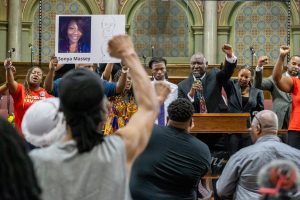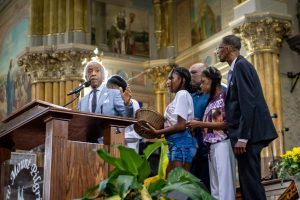In the wake of Sonya Massey’s death, advocates want the state to act
By Andrew Adams Capitol News Illinois — August 7, 2024
Attorney Ben Crump, who is representing the family of Sonya Massey, raises his fist during a speech at a rally in Chicago. (Photo by Andrew Adams/Capitol News Illinois)
Calls of “Justice for Sonya” rang through the sanctuary of a church on Chicago’s West Side on Tuesday, July 30, at a rally hosted in response to the death of Sonya Massey on July 6.
Massey, a Black woman, was killed in her home by Sangamon County Sheriff’s deputy Sean Grayson. Grayson, who is white, pleaded not guilty to charges of first-degree murder, aggravated battery with a firearm and official misconduct stemming from the incident.
But for activists organizing around Massey’s death, Grayson’s charges are not enough to satisfy their calls for justice.
“There is something wrong with policing in the state of Illinois,” the Rev. Al Sharpton, whose National Action Network helped organize Tuesday’s rally, said.
Sharpton, who spent Monday with President Joe Biden discussing the 60th anniversary of the Civil Rights Act, renewed his calls on Congress to pass a version of the George Floyd Justice in Policing Act, which was introduced in 2021.
But the longtime civil rights activist said while that bill is stalled in Congress, Illinois should act on similar legislation.

The Rev. Al Sharpton stands with the family of Sonya Massey, including her children and mother. (Photo by Andrew Adams/Capitol News Illinois)
“We’ve got Black faces in high places in Illinois. Well, stand up and do something,” Sharpton said. “We didn’t elect you to give us a press release. We want justice, we want fairness, we want equality. And if you can’t do the job, then step back and let some people with some backbone step up and do what needs to be done.”
Sharpton called on Illinois officials to enact more police reforms through a “Sonya Massey Law,” a name echoed in chants from the crowd throughout Tuesday evening’s rally.
“In this law we need to make it illegal for police to be switching districts,” Sharpton said.
This proposal comes, in part, from Grayson’s work history. The 30-year old worked in six law enforcement agencies over four years before Massey’s death.
Prior to joining the Sangamon County Sheriff’s Office, he worked in Logan County, where he disregarded orders during a high-speed chase and faced at least one misconduct complaint.
Some measures outlined in the George Floyd Act are mirrored in Illinois’ Safety, Accountability, Fairness and Equity-Today, or SAFE-T, Act, such as body camera requirements, a ban on chokeholds and expansions to police misconduct databases.
While that law, which sparked significant opposition from Republicans in the years since its passage, has been amended several times, some want further reform.
Chicago-based civil rights lawyer Antonio Romanucci, who worked on the George Floyd case, said Tuesday that the Democratic National Convention in Chicago will provide activists an opportunity to lobby Gov. J.B. Pritzker and legislative leaders at the state Capitol to amend the SAFE-T Act.
Specifically, he advocated for instituting a waiting period for officers transferring between departments to allow for “proper vetting.”
“We want to fix this hole,” Romanucci said. “The SAFE-T Act is flawed.”
Senate President Don Harmon, D-Oak Park, defended the SAFE-T Act in a statement Wednesday, but said he would consider new ideas in response to Massey’s death.
“We took steps to address this in the SAFE-T Act by requiring law enforcement to report misconduct violations when an officer is terminated or when an officer resigns under investigation of criminal offenses,” he said. “However, our work is not done, and I am open to any ideas for legislative action to prevent a tragedy like this from ever happening again.”
Jaclyn Driscoll, a spokesperson for House Speaker Emanuel “Chris” Welch, D-Hillside, said Grayson “should not have been an officer of the law given his track record.”
“It is the responsibility of our police and sheriff’s departments to utilize the tools this law provides,” Driscoll said. “With that said, Speaker Welch remains committed to responsible reform and refinements of the SAFE-T Act to ensure no family has to endure the same pain and suffering that Sonya Massey’s is right now.”
Romanucci also pointed blame for Massey’s death at Sangamon County Sheriff Jack Campbell and called on him to resign. Massey’s father, James Wilburn also called on Campbell to step down.
Campbell attended a listening session facilitated by the U.S. Department of Justice on Monday, where he apologized and said his department “failed” Massey, her family and the community. He also said he did not plan to resign.
“He wanted to ask our forgiveness,” Wilburn said. “Anyone else in my family can forgive him, but I’m not. Because he has my baby’s blood on his hands. He’s got to go.”
Wilburn indicated that if Campbell didn’t resign and if no one else ran against him, he would take matters into his own hands and try to unseat Campbell, who was first elected to his position in 2018, and reelected in 2022.
“I’m not announcing my candidacy yet,” Wilburn said. “But I will. But I will.”
Massey’s family is being represented by Ben Crump, dubbed by Sharpton as the “attorney general for Black America.” Crump has risen to national prominence in recent years after he began representing families of Black people killed by law enforcement officers, including George Floyd, Breonna Taylor, Jacob Blake, Daunte Wright and others.
The rally Tuesday was the latest in a growing list of marches, rallies and protests held in response to Massey’s death.
Activist groups declared Sunday, July 28, a “day of mourning” for Massey and groups held events in New York, Los Angeles and St. Louis among other locations. In Springfield, around 300 people gathered at Comer Cox Park with the Massey family as part of the nationwide demonstrations.
On Saturday, Chicago saw a rally calling for police reform and a downtown march attended by hundreds. That march was organized in response to Massey’s death as well as the deaths of two Black men – Samuel Sharpe Jr. and D’Vontaye Mitchell – in Milwaukee earlier this month. That group also wants Congress to pass reforms initially introduced in 2021.
“The murder of Sonya Massey is one of the most horrific police killings I’ve ever seen,” Frank Chapman, one of the organizers of Saturday’s protest and longtime left-wing activist, said in a statement last week. “And just like Congress refused to pass an anti-lynching bill for a hundred years, they are refusing to pass the George Floyd bill now.”
Andrew Campbell contributed reporting to this story.
aadams@capitolnewsillinois.com
Capitol News Illinois is a nonprofit, nonpartisan news service covering state government. It is distributed to hundreds of print and broadcast outlets statewide. It is funded primarily by the Illinois Press Foundation and the Robert R. McCormick Foundation, along with major contributions from the Illinois Broadcasters Foundation and Southern Illinois Editorial Association.







